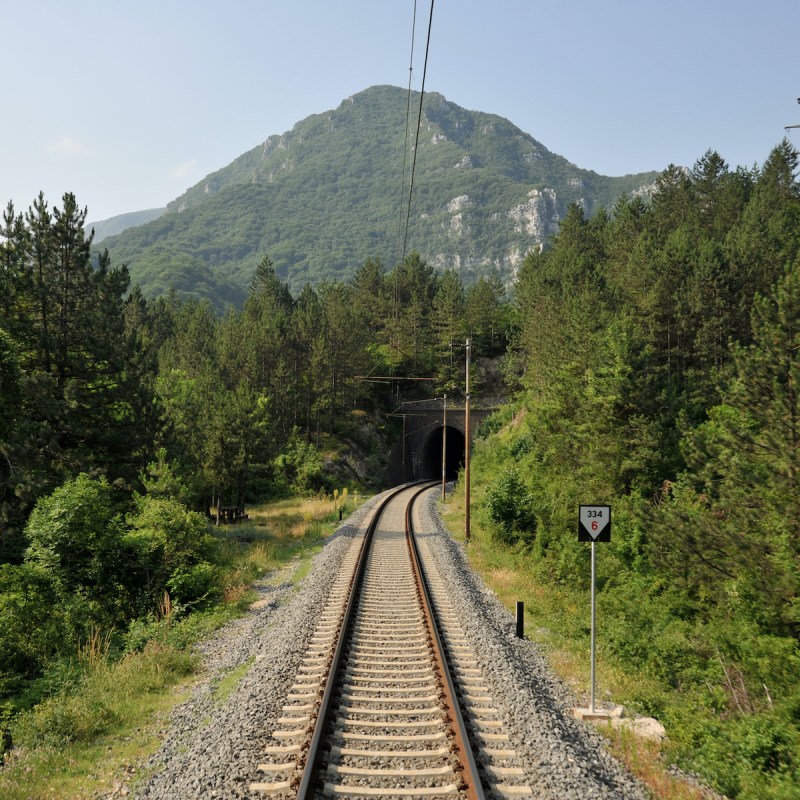
This summer, I excitedly resumed travel. After the worst of the pandemic, I was ready to get back to my world explorations. I started with a flight to Paris to visit friends and some of my host family, whom I hadn’t been able to see in person for 3 years. As I began deciding where to go afterward, I got the impression that flying anywhere would be difficult, stressful, and result in losing my bag.
Videos by TravelAwaits
One of the benefits of traveling full time is having time to travel slowly. So instead of putting up with the chaos of air travel, I set out to explore parts of the Balkans on land. My plan was to get from France to Turkey, then back up to Scotland in mid-September to meet my mom. For 2 months, I traveled by bus, boat, and train. Here’s what I learned.

1. Technology Changes From One Country To The Next
I got hooked on the Flixbus app. It was so easy; choose a destination, book a ticket, and go… almost everywhere I wanted to travel.
The hard part was figuring out where the bus departed from. Many places I departed from didn’t have a bus station. Instead, there was a sign on a street from which people queued up to board the bus. As I traveled farther south, however, it was like traveling through time. In Bosnia, I learned that my app had no use because drivers didn’t use their phones to check us in. Instead, I had to print my ticket and check in at a ticket window inside the bus station. (And I sometimes had to pay a station tax amounting to about 50 cents USD.) This can be tricky when you don’t have a printer. Luckily, every place I stayed was able to print my tickets for me.

2. Service And Boarding Are An Adjustment
Traveling through Western Europe, even if I pre-booked a specific seat, the reservation was unreliable because the seat numbers on the app often didn’t match the configuration of the actual bus. In the Balkans, seat selections seemed more reliable. I expected the opposite.
The one train I took in the Balkans, however, left me craving other systems. In Mostar, Bosnia, I took the train to Sarajevo. The train station was made of cold, gray, stone block construction. There were only two ticket windows. Neither of the agents spoke any English. I managed to buy my ticket, and somehow understood, via rudimentary sign language, that I needed track 1. When I walked away from the ticket window, I realized there were no indications of track numbers.
I went back to the window, and they pointed to a staircase. I asked where the elevator was. They nodded their heads. No elevator. Three sets of stairs. Bosnia and Herzegovina is a country where the government doesn’t put money toward infrastructure; one of the downsides is that this makes many services inaccessible to the elderly and handicapped.
There were no seat assignments for the train, and the platform was packed. I quickly understood why everyone rushes and crams onto the closest doorway as if in an exercise in survival. It was stressful and, as it turned out, completely unnecessary, as there were plenty of available seats.

3. Roads Vary, And You Might Take To Prayer For Some Routes
While most of the roads the buses drove on were more or less paved and wide, there was a detour on my ride from Bosnia to Montenegro where I was certain I was going to die.
We were in a standard-sized bus, like any Greyhound in America. Apparently, heavy rains the previous night had caused a boulder to fall into the main road and block it. The driver backed up and started down another road. It became less paved, and then we were on one of those roads where the views take your breath away — but not quite as much as the fact that you’re on a tiny road on the side of a cliff with a long drop to the ground below.
Our drivers (there were two) waited for the cars to pull off the road to pass. The road was so narrow the cars had to drive off and up the side of the mountain to get out of the way. I hoped we would give up and go back, but the line of traffic behind us made that impossible. We came to a turn in the road where I wanted to get off the bus; there was no way that bus could turn and also stay on that road. I tried to plug into the energy of the passengers who seemed excited about this crazy driving. When, to my incredulity, the bus made the turn without dropping off the cliff, every passenger on the bus applauded. I’m not sure if we were congratulating the drivers or just checking if we were alive, but traveling on scary roads is part of the adventure.

4. Immigration Is Nothing Like The Airport
If you’re used to flying, you know you show your passport to board your flight and then queue up to get it stamped or scanned in the country you land in. When you cross borders by bus through The Balkans, the experiences get less and less comfortable as you proceed south.
In Croatia and Slovenia, we would get off the bus, queue up for our exit passport stamp, walk across the border to the next immigration officer (always one agent in a booth) and get an entrance stamp. In Croatia, the officer giving us our entry stamp was very slow. When I finally arrived at the booth, I learned why. He was very chatty. He wanted to know all about New York and to tell me about his country, which he loved. I’ve never met such a nice and chatty immigration officer.
But once I got to the Montenegro border, things changed. Instead of getting out of the bus, we gave the driver our passports. I’m not sure how he knew he got everyone’s, but we passed them to the front of the bus and he gave them to another man, who I presumed was an immigration officer. I wondered if I’d ever see my passport again. Then we waited. And waited. Eventually, someone came back to the bus and handed a pile of passports to the driver, who gave them to the person in the first row to hand out. That would have been fine if the driver hadn’t driven off before verifying that we all had our passports back. This happened in Albania, as well, so I figured this is just how they do things, and I better hope and pray my passport was there.

5. Language Barriers Are Tough
As someone who speaks six languages, I’m always frustrated when in a country where all I know is “hello,” “please,” and “thank you.”
In addition to the train station employees in Bosnia, the bus drivers also didn’t speak English. I befriended my seatmate on my ride to Albania. In the Balkans, it turns out that people from the former Yugoslavian countries all speak, basically, the same language. So when we went through the passport exercise, my friend could communicate with the driver, and she was able to handle passing out all our passports. But I couldn’t shout, “Driver, please stop! I don’t have my passport yet!” which made me more than a little uncomfortable.

6. Bus Travel Is Safer And More Reliable Than I Imagined
While this summer seemed plagued by baggage delays, flight cancelations, and train strikes, all the buses I took arrived on time. I was disappointed that my bags weren’t tagged, like they are in South America, but my luggage always arrived. (And I did use Apple tags just in case!)
Crazy road detours aside, the drivers all seemed safe, and for longer rides, there are two drivers, ensuring that each is well-rested when at the wheel.

7. Reviews Aren’t Always Accurate
During my time in Sarajevo, I met a lovely man from Italy. It was because of him that I learned there was a boat from Dubrovnik to Italy. I realized taking the boat could save me a lot of time, and, to be honest, I was tired of riding buses by then. I saw the boat also left from Albania, so I booked my passage from Durres.
I checked the reviews of the two main boat companies. They were terrible! They spoke about poor communication, people sleeping on the floors being a fire hazard, and left me debating my choice of travel.
Despite the reviews, the experience was lovely. Mostly because the sea was smooth as silk overnight, but also because I booked my own cabin and even when walking around, I only saw a few people sleeping on the floor. All-in-all it was a wonderful ride.
While my modes of transport were not the most comfortable, they gave me a road-and-seaside view of each country I traveled through, a taste of how differently immigration matters are handled, and more than a few funny memories to look back on. Better yet, I didn’t have to pay any luggage fees the entire summer!
